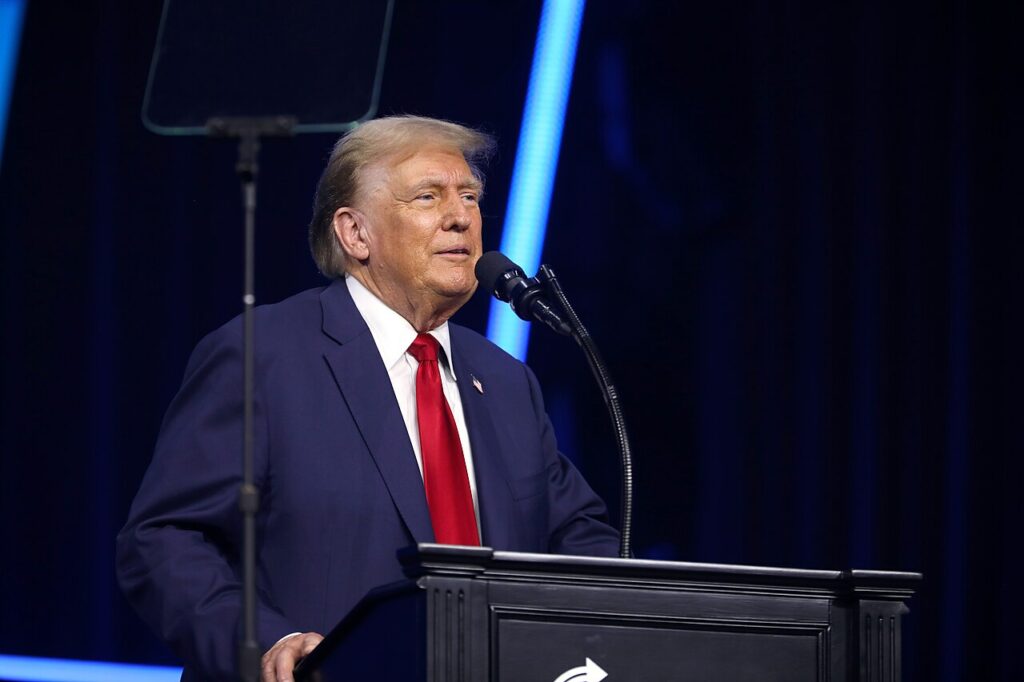Trump Aims to Destabilize the U.S. if He Faces Election Defeat

Trump’s Election Conspiracy Campaign Raises Concerns Among Experts and Republicans
As the 2024 presidential election approaches, former President Donald Trump and his allies are intensifying their efforts to spread conspiracy theories about election fraud. This strategy is seen by many election experts and veteran Republicans as an attempt to preemptively undermine the election results if Trump loses. The potential consequences of these actions could be dire, according to a recent report by The Guardian.
The Recurring Narrative of Fraud
Trump and his supporters, including organizations like Turning Point USA and True the Vote, are recycling false claims from the 2020 election while introducing new accusations aimed at federal and state prosecutors. These prosecutors have charged Trump with attempting to overturn his 2020 defeat, and the former president’s rhetoric now includes baseless fears that noncitizens will vote in significant numbers in 2024, a claim that has been widely debunked.
Turning Point USA has launched a multi-million dollar campaign to mobilize voters in key swing states. However, these efforts are coupled with rallies where unfounded allegations of election fraud continue to be promoted. Trump’s persistent claims of “election interference” and “lawfare” are seen by experts as an effort to rally his base while undermining trust in the legal system.
During a June debate with President Joe Biden, Trump was asked if he would accept the results of the 2024 election. While he initially stated he would accept a “fair and legal” election, he quickly reverted to false claims of widespread fraud in U.S. elections, indicating his readiness to challenge the results if they do not favor him.
Mobilizing the Base While Sowing Distrust
The dual efforts of promoting voter turnout and casting doubt on the electoral process are central to Trump’s 2024 strategy. Turning Point Action, the political arm of Turning Point USA, has announced plans to spend tens of millions of dollars on voter outreach in critical states like Arizona, Michigan, and Wisconsin. At the same time, these efforts are being amplified by events that raise fears of election rigging.
True the Vote, a Texas-based organization known for pushing election fraud theories, is also ramping up its activities. The group has partnered with sheriffs in Wisconsin to monitor drop boxes, echoing their controversial and widely discredited efforts from 2020.
The Impact of Conspiracy Theories on Democracy
The actions of Trump and his allies are widely viewed as an attempt to undermine confidence in the electoral process. Dave Trott, a former Republican congressman from Michigan, has publicly criticized these efforts, accusing Trump of perpetuating lies about election fraud to prepare a “plan B” in case of a loss. This sentiment is echoed by David Becker, head of the Center for Election Innovation & Research, who warned that these false claims are designed to sow discord and potentially incite violence if the election results do not favor Trump.
Adding to the tensions, Trump has launched baseless attacks on Kamala Harris, accusing her of leading a “vicious, violent overthrow” of President Biden. He has also suggested that Harris and Biden intentionally failed to provide adequate security at his rallies, contributing to an assassination attempt against him. These allegations, while unsubstantiated, are part of a broader narrative intended to portray Trump as a victim of political persecution.
The Road to 2024: A Pivotal Moment for American Democracy
As the election approaches, the efforts by Trump and his allies to both mobilize voters and cast doubt on the integrity of the electoral system are intensifying. While Turning Point USA has had mixed success in past elections, they have demonstrated their ability to influence key races, such as their role in unseating Maricopa County’s top election official who resisted election denialist claims.
The stakes for the 2024 election could not be higher. With Trump refusing to commit to accepting the election results and his supporters prepared to challenge any unfavorable outcome, the election is shaping up to be a critical test for the resilience of American democracy.

